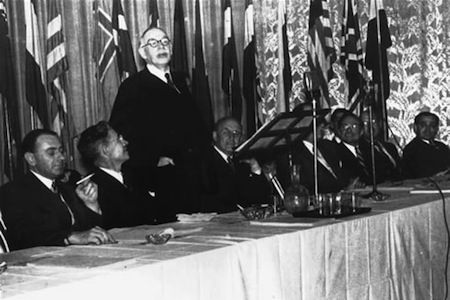The Bretton Woods Transcripts, Hiding in Plain Sight

Credit: World Bank.
Sometimes important historical material is listed for all the world to see, has been read and cited by scholars -- yet still goes unremarked. Such was the case with the transcripts of the 1944 Bretton Woods conference, which I found in 2010 and which have recently been published as a book.
The Bretton Woods conference, held in the New Hampshire town of the same name, approved agreements for the International Monetary Fund and the World Bank, two institutions that are still active and important. It also marked a break with the economic policies that had existed in the 1930s. The related disasters of world depression and world war convinced the governments represented at the conference that they had to act in a spirit of cooperation. Despite many tests in the years since, the spirit of international economic cooperation has generally persisted and deepened.
Because the conference was so significant, many books and articles have discussed it. None made use in any significant way of the conference transcripts, though. The U.S. government employed stenographers at the conference. They attended many committee meetings and tried to give a word-for-word account of the action. The transcripts were typed up and an unknown but evidently quite small number of copies was made. In 1948 the Government Printing Office published the proceedings of the Bretton Woods conference, but, in accord with conference rules, the minutes of committee meetings were brief, sanitized summaries rather than word-for-word accounts.
I happened across a copy of the transcripts while browsing through a section of uncatalogued material in the library of the U.S. Treasury, where I have my day job. The uncataloged section attracted my attention because it was near a section in the basement compact storage area that had material I was seeking on another subject. I spotted a few black bound volumes stamped “Transcript of Minutes of Meetings of United Nations Monetary and Financial Conference,” the official name of the Bretton Woods conference. Looking through them, I saw some remarks by John Maynard Keynes that were unfamiliar to me. Keynes is the best-researched economist of the twentieth century, having been the subject of many studies, including a magnificent three-volume biography by Robert Skidelsky. I skimmed some works on Keynes and the relevant parts of the thirty-volume Collected Writings of John Maynard Keynes to see if any of them referred to the transcripts. Nothing. I knew then that I had stumbled on an important document.
At first I thought the Treasury Library had the only copy of the transcripts. As I did further research, I found that there was another copy in the International Monetary Fund Archives, and what appears to be the original in the National Archives, whose existence my colleague Andrew Rosenberg confirmed. I then found that the transcripts had been known to and cited by earlier scholars, but that current-day scholars were unaware of the earlier references. The official history of the IMF’s early years, written by J. Keith Horsefield and published in 1969, referred to them only to dismiss them as “unofficial verbatim reports, but the incomplete and provisional nature of these reports makes them of uncertain value.” A 1982 monograph by the Norwegian journalist Dag Halvorsen on Norway and the Bretton Woods system cited the transcripts, but the monograph, in Norwegian, is understandably not widely known: only the Library of Congress and some institutions in Oslo seem to have copies.
Another reference, though, was readily available. The IMF Archives has listed the transcripts on its public Web site at least since 2007. Under the section of material on the Bretton Woods conference, the transcripts were listed there for anybody to see who had access to the Internet.
